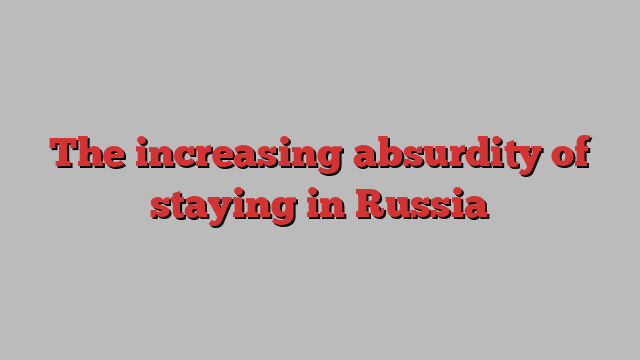
Receive free The Top Line updates
We’ll send you a myFT Daily Digest email rounding up the latest The Top Line news every morning.
For a while French cement group Lafarge operated a plant in North Korea, about 40km from Pyongyang — except it didn’t, really.
The expat supposedly running the facility sat in the capital and could only visit with a minder. Operational or financial control over the plant was illusory. But the French company, which inherited the asset when it bought Egyptian construction group Orascom in 2008 and has since merged with Swiss rival Holcim, kept a stake until 2017 and would regularly send teams of internal auditors. Welcome to Absurdia!
Russia may not yet be North Korea but for the expats running western businesses there a similar sense of unease must be starting to creep in.
Eighteen months after the full-scale invasion of Ukraine, a significant number of western brands are still operating in Russia and some have no intention of leaving, including German retailer Metro and US cigarette maker Philip Morris.
Managers of these companies’ Russian subsidiaries (a German national for Metro) have to contend with an ever more restrictive regulatory environment, as well as the moral issue of playing an active role in Russia’s wartime economy. These groups are also running businesses that are no longer really theirs.
If these Russian operations happen to be profitable, the money may not be accessible — the Kremlin last year imposed a ban on dividends to businesses from countries deemed “unfriendly”, including the US, UK and all EU members.
The amounts at stake are not insignificant: the Kyiv School of Economics, which keeps close tabs on the western corporate presence in Russia, estimates that companies from such countries amassed $18bn in Russian profits and $199bn in revenues in 2022 alone. The Kremlin somewhat relaxed the rules in August but with stringent conditions, among them that payouts cannot exceed a company’s committed investment in the country. In effect it is Vladimir Putin’s regime that decides who gets their money.
If you want out, it is now too late to withdraw from the country in conditions allowing the extraction of much value, if any. The Kremlin must approve any sale of companies in strategic sectors such as banking and energy. It imposes a minimum 50 per cent discount on the value of the assets sold and requires a 10 per cent “voluntary” contribution to the state budget. But that is only if it has not confiscated the assets to hand them over to regime loyalists, as with the seizures of Carlsberg and Danone in July.
“Western firms that chose to remain in the Russian market are now stuck with billions in profits they cannot repatriate, and there is no reason to believe that the Russian leadership will adopt a more flexible posture on this question any time soon,” says Agathe Demarais, senior policy fellow at the European Council on Foreign Relations. “If anything, the Russian government will probably adopt an even more hardline approach, with asset seizures likely — notably for companies that brought R&D or high-tech knowhow to Russia.”
A fresh push in the US and Europe to use $300bn worth of frozen Russian sovereign assets to fund the rebuilding of Ukraine probably spells more bad news for western groups in Russia. If the assets are lost to the Kremlin, the argument for corporate seizures in Russia will become stronger.
Any western company still nurturing the hope of recouping its investment in the country is mistaken.
“Beyond moral considerations,” Demarais says, “it is clear in hindsight that it made more sense for western firms to leave Russia immediately than to adopt a wait-and-see approach”.